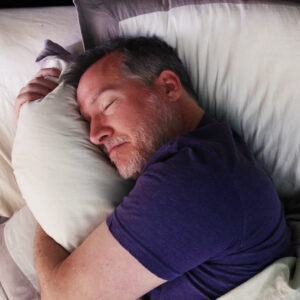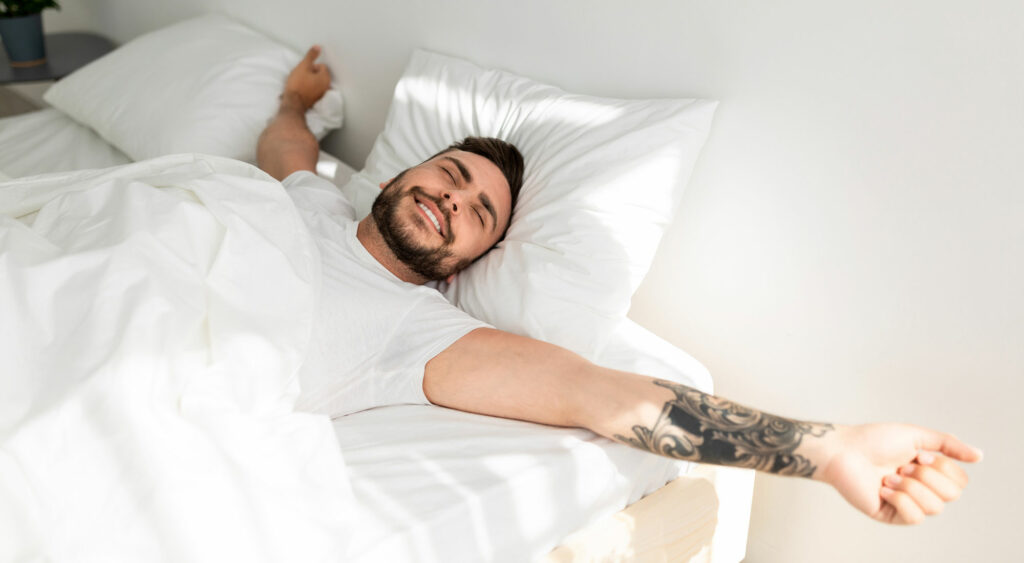By Anna McKenzie
We know that we need sleep, but we often experience obstacles to getting the appropriate amount of rest. We may deprioritize sleep in favor of work or commitments; we may have periods where sleep is hard to come by, such as when we’re sick or in the thick of parenting. But other times, mental distress is the culprit for our restlessness.
When we lose sleep due to anxiety, depression, or other mental health issues, we can actually exacerbate our symptoms. So in what ways can we embrace the importance of sleep in order to improve our mental health?
What Is Sleep Health?
Sleep health is critical for both your physical and mental health. Your mind and body need time to rest, reset, digest, heal, and process information. Sleep offers this opportunity, which means that missing out on sufficient rest, especially on a consistent basis, can hamper your ability to function. The American Academy of Sleep Medicine (AASM) says that healthy adults need at least seven hours of sleep every night to stay healthy. For young adults, people who are ill, and those who have accumulated sleep debt, nine hours per night is recommended. AASM also states that more than a third of Americans are not getting the appropriate amount of sleep on a regular basis.
The COVID-19 pandemic had a serious impact on our sleep quality. According to the Sleep Foundation, roughly 40% of people had issues sleeping during the pandemic, a phenomenon that sleep experts called “coronasomnia.” Financial stress, emotional stress, distance from others, unpredictability, and professional concerns were the top factors disturbing our sleep during the pandemic.
The Sleep Foundation also says that stressful events cause a decrease in slow-wave sleep and an increase in wakefulness. A higher amount of cortisol, the stress hormone, in your bloodstream will disrupt the production of melatonin, the sleep hormone. When your cortisol and melatonin levels are not rising and falling properly, you may feel both “tired and wired,” unable to function properly during the day and unable to sleep adequately at night.
Improving Sleep to Improve Mental Health
In a study on sleep and mental health, Preventing Chronic Disease reports that “inadequate sleep was associated with significantly increased odds of frequent mental distress.” It also reports that getting less than six hours of sleep per night made participants 2.5 times more likely to experience mental distress.

Sleep and mental health are interconnected. Sleep problems can cause mental health problems; mental health problems can cause sleep problems. Sleep Medicine Reviews says that “people with insomnia are 10 and 17 times more likely than those without insomnia to experience clinically significant levels of depression and anxiety, respectively.”
Poor sleep quality has a critical impact on coping skills and emotional regulation. AIMS Neuroscience reports that without the right amount of quality sleep, we become increasingly reactive when things don’t go our way. On the other hand, “Healthy sleep repairs adaptive processing.”
That means that sleep is more than just a necessity: It’s a coping skill. Giving adequate rest to your body enables you to respond to the world better, especially if you’re overstimulated, dealing with difficulties, or handling relapse triggers. Your recovery gets a major boost when you’re able to get at least seven hours of quality sleep.
But sleep may not come easy, especially if you’re under stress, experiencing mental health symptoms, or changing your routine. Instead of viewing it as “pass or fail,” your journey to better sleep should be viewed like exercise, where you have to train your body to start seeing progress.
Healthy Sleep Habits
To train your body and mind to get better sleep, you’ll want to practice some healthy sleep habits, such as the following:
- Turn off your screens. Put away or power off TVs, phones, and computers at least an hour before going to bed. Reducing stimulation and blue light exposure tells your brain it’s time to start winding down, says Harvard Health Publishing.
- Be consistent. Having a regular bedtime and wake-up time helps your brain regulate your levels of cortisol and melatonin accordingly.
- Eat balanced meals. Nutrition plays a vital role in your sleep and wakefulness. Meals high in sugar or saturated fat, refined carbs, and low fiber in your diet can disrupt your blood sugar levels. Eating whole grains, protein, fruits, and vegetables will help you sleep better at night.
- Have a calming routine. Meditating, taking a bath, drinking herbal tea, reading a book, and journaling can have a peace-inducing effect on your mind and body. Journaling especially can help you get anxious thoughts out of your mind before the lights go out.
- Exercise regularly. Nervous energy plays a role in keeping your mind awake. Exercising, recreational activities, and even creative endeavors can help channel that energy during the day, so it doesn’t interrupt your sleep cycle at night.
Support for Your Recovery
Looking for support for your recovery journey? You’re not alone; we’re with you! MBH Onward is here to help you connect and move forward in community as you choose healing over hurt and live authentically in recovery. Contact us to learn more about all our Alumni program has to offer and how we can walk with you in your continued wellness.

